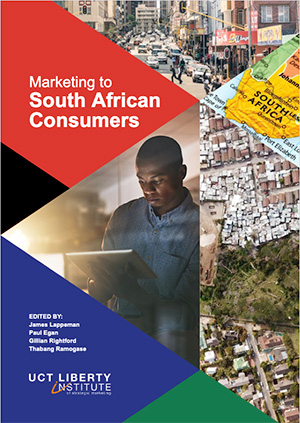Open textbook reaches new milestone
20 June 2025 | Story Azraa Dawood. Read time 5 min.
In a powerful testament to the impact of open educational resources, Marketing to South African Consumers by Associate Professor James Lappeman has surpassed a remarkable 250 000 downloads. This milestone highlights the growing role of open textbooks in democratising access to knowledge in South Africa, where affordability and contextual relevance remain pressing challenges in higher education.
Associate Professor Lappeman, the head of marketing studies at the University of Cape Town (UCT) and the head of projects at the UCT Liberty Institute of Strategic Marketing, originally hoped the book would reach 10 000 downloads within its first year. That target was surpassed within months. Five years on, the textbook continues to exceed expectations, with its highest monthly download count recorded as recently as April 2024.
Relevance, access, and equity
Hosted on UCT’s OpenUCT platform, the textbook fills a critical gap in South African marketing education. Unlike many commercial alternatives, it is rooted in the lived realities of local consumers and brands. For students, this makes marketing theory not only accessible, but relevant. For lecturers, it offers a much-needed alternative to expensive, foreign-produced texts.

The textbook’s reach is not just a metric of popularity – it is a marker of equity. In a country where the cost of course materials can be a barrier to participation, open textbooks offer a meaningful intervention. “Students are under immense financial pressure,” said Lappeman. “And the joy it brings to have a class full of students knowing that none of them will be without the textbook is a great feeling.”
Built on collaboration and social justice
Making quality materials freely available to all students, regardless of income, is one way to challenge structural exclusion in higher education, Lappeman noted. The development of Marketing to South African Consumers was grounded in this commitment to social justice. The book was produced with the support of the Digital Open Textbooks for Development (DOT4D) project in the Centre for Innovation in Learning and Teaching (CILT), and in collaboration with UCT Libraries. Together, this team shared a vision: to create a high-quality, open-access resource specifically designed for the South African context.
While the project relied heavily on volunteer authorship, its success also hinged on institutional infrastructure and publishing expertise. “When we conceived of the textbook, we believed that we could put together a team to write a world-class resource for free,” Lappeman reflected. “But it wasn’t just the authors; without CILT, DOT4D, and UCT Libraries, the project would not have taken off.”
Expanding reach, inspiring change
Since its publication, the textbook has become a core resource in marketing courses across the country. It is also being used as a supplementary text in other disciplines, attesting to its flexibility and value beyond its original scope. For lecturers, one of the key benefits lies in its accessibility: students can be referred to specific case studies or concepts without concern that some may not be able to access the content.
“Top-quality open textbooks stand at the nexus of these ideals.”
This is especially significant at institutions like UCT, where balancing high academic standards with inclusive practices is a constant imperative. As Lappeman put it, “Top-quality open textbooks stand at the nexus of these ideals.”
The global reach of the textbook has also been a welcome surprise. With downloads recorded in over 130 countries, Marketing to South African Consumers is not only shaping local classrooms but contributing to a broader conversation about how context matters in marketing education. It is a powerful example of how African knowledge can be shared on a global stage and on its own terms.
A call to action for open publishing
Lappeman encourages other academics to consider open publishing, even if the path is not easy. “Large projects that make a difference are difficult. If it was easy, more people would do them,” he said. “But with enough great content and willing volunteers, even a fledgling idea can build momentum. We had no idea the book would be so well received – 250 000 downloads is a massive return on our collective investment.”
At a time when the decolonisation of the curriculum, the cost of education, and the relevance of learning materials remain at the forefront of public discourse, Marketing to South African Consumers stands as a tangible case study in what is possible. Open textbooks are more than free PDF; they are tools of transformation.
 This work is licensed under a Creative Commons Attribution-NoDerivatives 4.0 International License.
This work is licensed under a Creative Commons Attribution-NoDerivatives 4.0 International License.
Please view the republishing articles page for more information.










